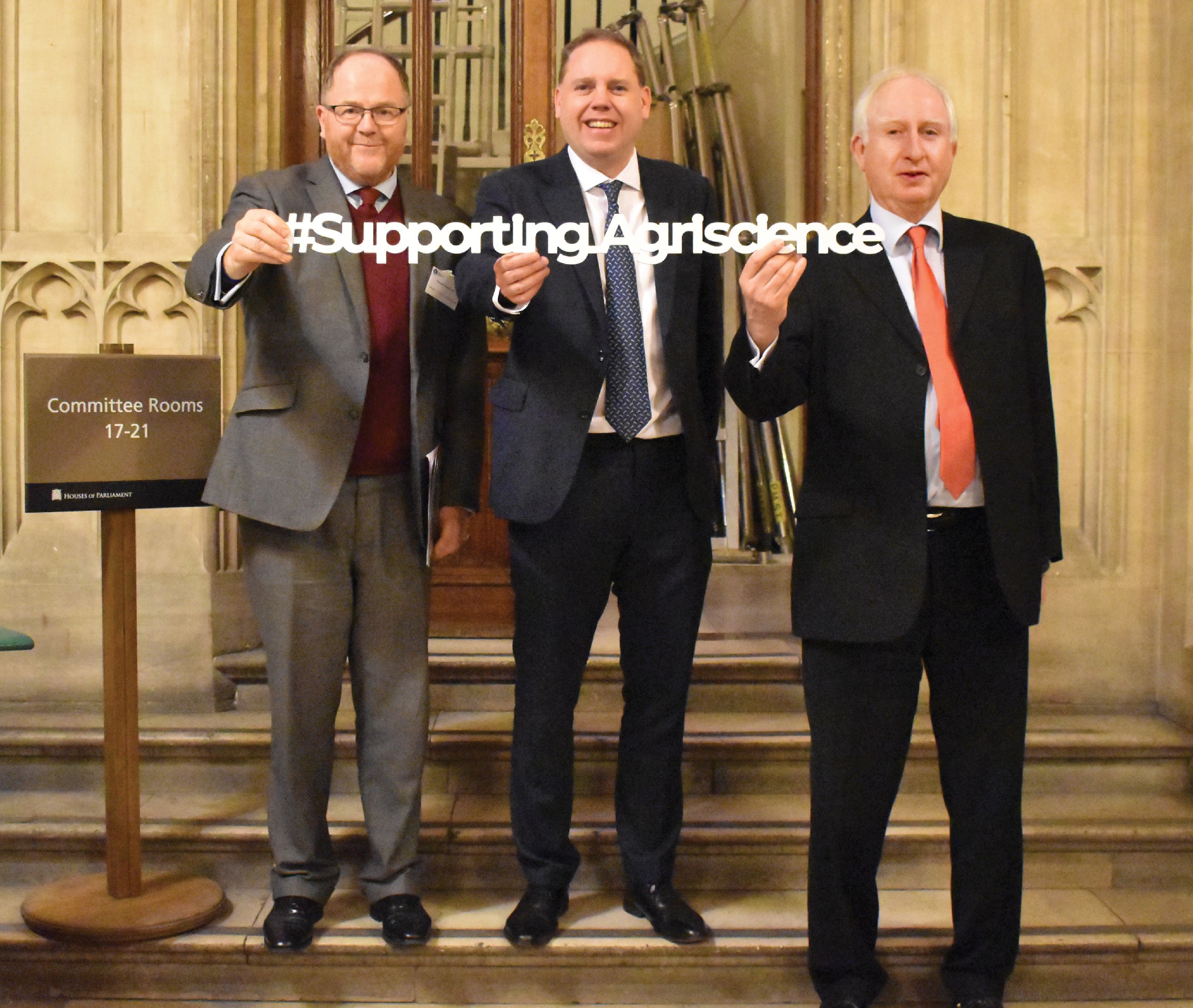The big picture: using wildflower strips for pest control
Rothamsted scientists took part in a four day showcase of science and technology in the farming sector as part of Agri-science Week in Parliament. Hosted by the All Party Parliamentary Group on Science and Technology in Agriculture (APPGSTA), the event brought together several of the UK's leading agri-tech research institutes including the John Innes Centre, The Roslin Institute and NIAB.
Rothamsted's display focussed on precision bred crops including gene edited cereals, including low acrylamide wheat and high lipid barley, plus a gene edited Camelina with enhanced seed oil composition.
As part of the programme, the APPGSTA issued a call for the UK Government to adopt an ambitious new Innovation Agenda for UK Agriculture, focused on clear, long-term objectives to increase domestic food production by 30% by 2050 while reducing UK agriculture’s environmental footprint by 50%. The 30:50:50 vision.
"Britain has some of the most cutting edge, world-leading research taking place in research institutes and university departments across the country. But we need a clearer plan to unlock its potential, and to translate that fantastic science into on-farm innovation."
George Freeman MP, Chair of the APPGSTA
Speaking at an opening ceremony for Agri-Science Week, APPGSTA chair George Freeman MP welcomed the UK Government’s strong commitment to food security, and that Defra minister Daniel Zeichner has confirmed that his Government wants the country to produce more food.

“Britain has some of the most cutting edge, world-leading research taking place in research institutes and university departments across the country," he said. "But we need a clearer plan to unlock its potential, and to translate that fantastic science into on-farm innovation. And our farmers and growers desperately need clarity and consistency about their purpose, first and foremost, as food producers.”
Rothamsted's Professor Johnathan Napier said, "Speaking for the whole Rothamsted team, this was a great event that we collectively found very inspiring. The chance to interact with MPs, Lords and other policy makers was a real benefit, as was interacting with colleagues from other institutes. And as a reflection of our commitment to cutting edge technologies, we were happy to have precision bred camelina seeds as part of our display. Overall, it is exciting to see the political emphasis on translation and impact, something that Rothamsted has a proud history in delivering. I am confident that Rothamsted’s science is going to play a key role in making agriculture more efficient and more sustainable.”

Omega-3 Camelina Development
Rothamsted Research is the longest-running agricultural research institute in the world. We work from gene to field with a proud history of ground-breaking
discoveries in areas as diverse as crop management, statistical interpretation and soil health. Our founders, in 1843, were the pioneers of modern
agriculture, and we are known for our imaginative science and our collaborative approach to developing innovative farm practice.
Through independent research, we make significant contributions to improving agri-food systems in the UK and internationally, with
economic impact estimated to exceed £3 bn in annual contribution to the UK economy. Our strength lies in our systems approach, which combines strategic research,
interdisciplinary teams and multiple partnerships.
Rothamsted is home to three unique National Bioscience Research Infrastructures which are open to researchers from all over the world:
The Long-Term Experiments,
Rothamsted Insect Survey and the
North Wyke Farm Platform.
We are strategically funded by the Biotechnology and Biological Sciences Research Council (BBSRC), with additional support from other national and
international funding streams, and from industry. We are also supported by the Lawes Agricultural Trust (LAT).
The Biotechnology and Biological Sciences Research Council is part of UK Research and Innovation, a non-departmental public body funded by a grant-in-aid
from the UK government.
BBSRC invests to push back the frontiers of biology and deliver a healthy, prosperous and sustainable future. Through our investments, we build and support a vibrant,
dynamic and inclusive community which delivers ground-breaking discoveries and develops bio-based solutions that contribute to tackling global challenges,
such as sustainable food production, climate change, and healthy ageing.
As part of UK Research and Innovation (UKRI), we not only play a pivotal role in fostering connections that enable the UK’s world-class research and innovation system
to flourish – we also have a responsibility to enable the creation of a research culture that is diverse, resilient, and engaged.
BBSRC proudly forges interdisciplinary collaborations where excellent bioscience has a fundamental role. We pioneer approaches that enhance the equality, diversity,
and inclusion of talent by investing in people, infrastructure, technologies, and partnerships on a global scale.
The Lawes Agricultural Trust, established in 1889 by Sir John Bennet Lawes, supports Rothamsted Research’s national and international agricultural science through the provision of land, facilities and funding. LAT, a charitable trust, owns the estates at Harpenden and Broom's Barn, including many of the buildings used by Rothamsted Research. LAT provides an annual research grant to the Director, accommodation for nearly 200 people, and support for fellowships for young scientists from developing countries. LAT also makes capital grants to help modernise facilities at Rothamsted, or invests in new buildings.